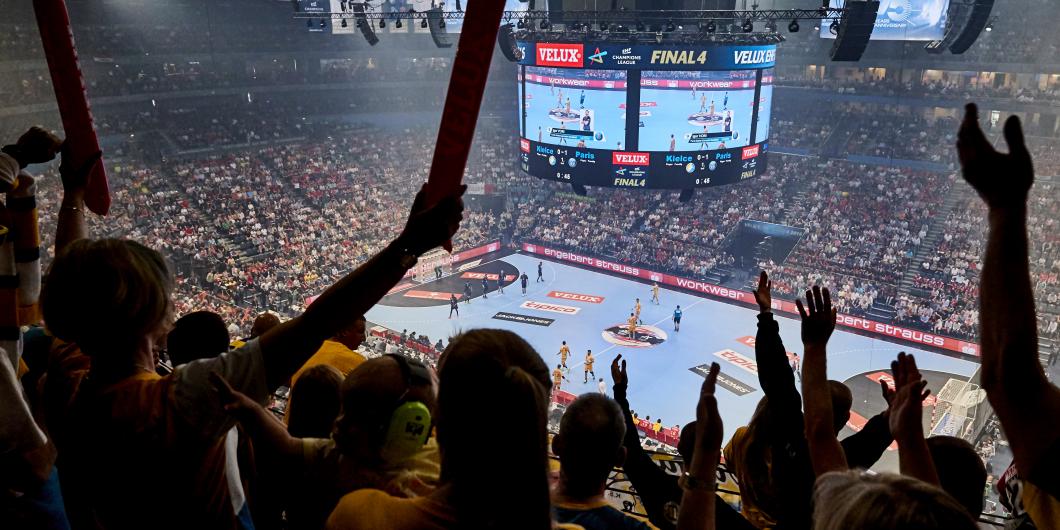The origins of EHF Marketing GmbH, the marketing arm and daughter-company of the EHF, can be traced back to the first Men’s EHF European Championship in Portugal in 1994.
A television deal had been signed with the then CWL Telesport und Marketing AG, now Infront Sports & Media for this international team tournament and this new development highlighted the need to successfully exploit the rights for club handball across Europe, and the world.
Less than a few years old, the EHF found that club competitions were being run like normal sporting competitions without any strategic marketing or without any promotion at all, just the finals of the were in control of the EHF. Not knowing which clubs would be in the final meant there was no strategic approach possible.
First marketing deal
It was agreed to then bring in Sponsor Service ASA from Norway and in the first marketing contract signed, the Champions League was included alongside the Super Cup and the Nations Cup.
This followed a re-structure of the European Cup competitions for clubs, which was a result of a working process involving internal and external experts from the field of competitions and marketing, receiving the full backing of federations and clubs.
The new structure paid special attention to the men’s and women’s Champions League with the aim to provide an even better chance for the competitions to reach their full marketing potential.
Described as a “handball tournament for handball clubs” the Champions League was described as being: “Staged yearly for both men and women, the Champions League consists of group matches (total 48 matches for men and 48 matches for women), quarterfinals, semi-finals and finals (a total of 14 matches for men and 14 matches for women). This gives a total of 124 matches which is the minimum number of events for the Champions League.”
The contract granted Sponsor Service all exclusive rights to the media and marketing rights in relation to the Champions League including the right to sell “SPONS” or advertising on the sleeves of playing shirts, the right to sell advertising boards and naming rights.
EHF takes marketing in-house
With this rapid development including the additional income for the clubs and the EHF came improved television figures and infrastructure, but due to the collapse of Sponsor Service ASA due to their other businesses failing in 2003 the EHF had to decide within a short time whether or not to take over the marketing of its club competitions and safeguard their future.
However, there existed a philosophical and legal issue. As a non-profit organisation the EHF it would be questionable for them to go in the direction of a marketing agency that could handle marketing partners.
At the 2002 EHF Ordinary Congress in Salzburg, Austria the EHF Executive Committee made the decision that the EHF should take over the marketing. This meant the formation of a more centralised marketing department for the men’s and women’s Champions Leagues which were now firmly established in the handball world. However, it quickly became apparent that the rapid development of the EHF Champions League needed further investment in structure and personnel.
EHF Marketing GmbH formed
Following a motion at the EHF Extraordinary Congress in Budapest 2004, EHF Marketing GmbH was formed on 1 July 2005. The motion presented to the Extraordinary Congress, which was unanimously accepted, included the following statements:
“The proposed changes had been made necessary by changes in the law governing non-profit associations as well as by changes in the EHF’s economic circumstances. In view of fiscal aspects it appears advisable to create a basis for the establishment of a for-profit company in order to be able to preserve the status of non-profit organisation for the core tasks.”
The EHF Secretary General assumed responsibility for the initial set-up and running of the new marketing arm, and for legal purposes, a managing director was appointed for the day-to-day running. Then in 2008, the Secretary General removed himself from EHF Marketing and the Managing Director assumed full responsibility.
At its foundation, EHF Marketing aimed ‘to professionally market European club competitions, by securing and developing the product’s identity while keeping the passion and spirit of the game intact.’
Rapid progress
EHF Marketing is situated in the middle of the EHF office in Vienna and strategically linked to all parts of the business, most notably the Competitions Department and the Media and Communications Department, a lot of coordination is necessary, but the structure of the department allows for very quick action to take place as well as reaction to events.
The rapid progression is a continuous process, which has seen the creation and development of the VELUX EHF FINAL4 into one of the biggest sports and entertainment events in international sports as well as the introduction of the Women's EHF FINAL4 and the signing of the first title sponsorship with the VELUX Group in 2010.
The expansion of the VELUX EHF Champions League in the 2015/16 season also meant further improvements as more teams and territories entered the competition, bringing with them different sponsorship and TV requirements.
This huge difference across Europe is always a challenge for the EHF and EHF Marketing, but one they relish and embrace.


